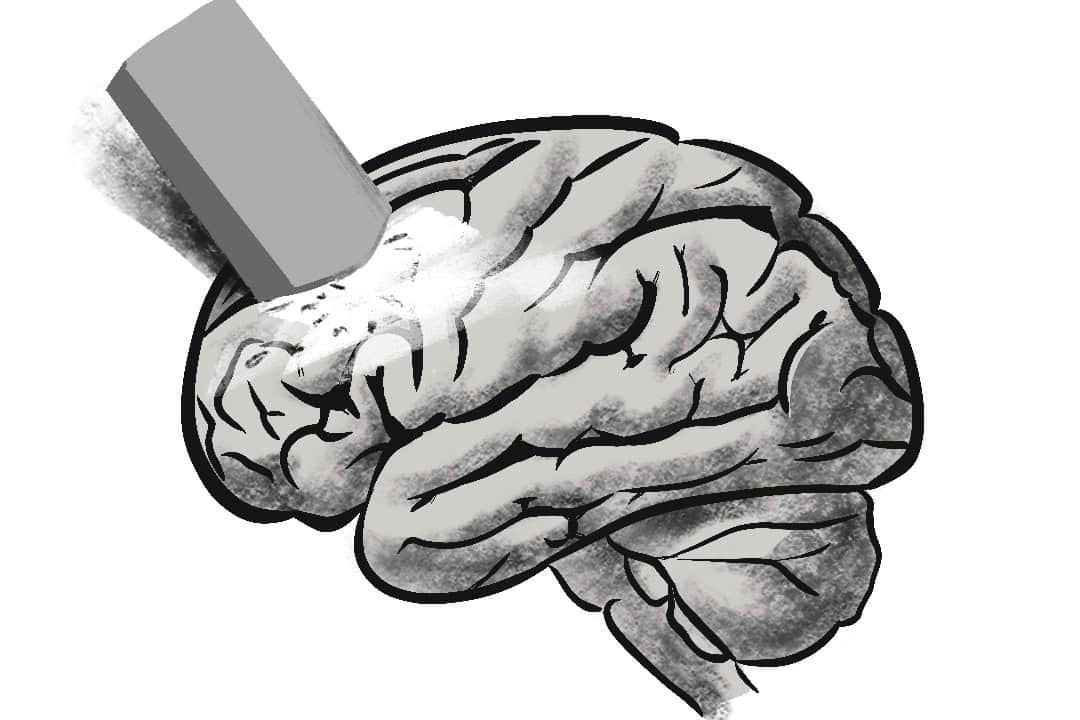Content warning: This article discusses anxiety disorder, post-traumatic stress disorder, and other trauma-related mental health conditions.
Imagine a world where we could erase the painful memories that keep us up at night. Whether it’s a traumatic event, an inconvenient phobia, or your MAT137 final exam, erasing it sounds like something out of the sci-fi movie Eternal Sunshine of the Spotless Mind, right?
Well, the science behind memory erasure isn’t as far-fetched as you might think. Researchers have been looking at the brain’s memory systems, and one of the most promising approaches involves disrupting the reconsolidation process — the phase in which the brain reactivates and alters existing memories. But how close are we to actually deleting memories and what could this mean for treating mental health conditions like PTSD?
The science of memory reconsolidation
Like play-doh, our memories are flexible and moldable. When you recall a memory, it temporarily becomes unstable as your brain brings it into your consciousness. This is when the reconsolidation process kicks in.
During the process, memories can be modified, strengthened, or even disrupted. While scientists have had trouble figuring out the exact conditions that determine when memory gets rewritten in the brain, this could potentially help treat anxiety disorders, PTSD, or other trauma-related mental health conditions.
While it hasn’t been directly tested on humans, scientists may soon be able to alter memory’s emotional or psychological impact, meaning a person may no longer feel anxiety, fear, or stress when recalling a specific memory.
Optogenetics is a biological technique that allows scientists to control the activity of cells using light. Scientists can alter the genes of neurons to be photosensitive — to activate in response to light. Depending on what the specific neuron’s purpose is, this means scientists can use light to switch that function on and off. What scientists are now attempting to do is to take things a step further — to disrupt the reconsolidation process by using light to switch specific brain cells involved in memory on and off.
By activating or deactivating specific neurons through optogenetics, scientists have managed to erase or even recover memories in mouse models. It was demonstrated that a fear-based memory in mice could be erased and then brought back, essentially flipping a switch in the mouse’s memory in regards to their emotional state. Although this technique is still relatively new and mouse brains can’t compare directly to humans, it offers potential for replication in human models.
Some think that some forms of drugs could produce similar results. Another study used propranolol — a drug that blocks stress hormones — to reduce the emotional impact of traumatic memories in humans. While it hasn’t always been effective, it has shown promise when administered before memory reactivation.
Could this help people with PTSD?
Symptoms of PTSD can cause people to repeatedly relive flashbacks and stress responses surrounding traumatic experiences. Current treatments — like exposure therapy — can help, but the fear can return with certain triggers, like objects that are associated with the traumatic experience. By targeting reconsolidation, researchers are trying to suppress or completely remove the traumatic memories that trigger PTSD symptoms. Some studies have shown that disrupting the reconsolidation of fear-based memories could provide a more permanent solution than traditional therapies.
Memory reconsolidation techniques might help with managing symptoms of PTSD, anxiety disorders, or even phobias. Imagine being able to erase your fear of heights or spiders with just a few sessions of targeted brain therapy.
While it sounds a bit scary, imagine how that could change the lives of folks who can’t leave home because of social anxiety or those who’ve never used the subway because of a fear of loud noises. These treatments could one day become a reality that makes the lives of these individuals easier.
Ethical dilemmas
While there appear to be potential benefits of memory erasure for conditions like PTSD, like any area of science, there are ethical implications. If we could delete traumatic memories, what would happen to the parts of our identity tied to those experiences? Would altering memories make us less authentic versions of ourselves because our personalities and behaviours aren’t being shaped by these memories?
There’s also the question of consent and control. What if this technology is misused? These concerns aren’t just theoretical: researchers argue that we need to address them before memory modification becomes a commonplace tool.
Do individuals have the right to erase their traumatic memories for personal well-being or would that change how society views suffering and healing? Would we start hearing people argue things like “why didn’t you just erase that memory rather than let it control you?” or, “I told you not to erase that memory, look what happened again because you didn’t learn from it.”
The natural process of recovering from trauma, growing stronger, and learning in the aftermath might be overshadowed by the desire to simply erase the pain.
The future of memory manipulation
Though we’re still far from offering memory erasure as a regular treatment, the science behind it is progressing. With continued research into optogenetics and drug-based interventions, we could soon create the tools to selectively target and erase specific memories for those who need treatment for PTSD, anxiety disorders, phobias, and more.
Alongside these advancements, we must have ongoing ethical discussions. How do we balance the benefits of erasing traumatic memories with the risks of misuse? Should there be limits on what kinds of memories can be erased, how much can be erased, and who can administer the treatment?
The neuroscience of memory erasure has the potential to change the way we think about mental health, trauma, and growth from our experiences. So, while we might not be living in the world of Eternal Sunshine just yet, we soon could be.



No comments to display.